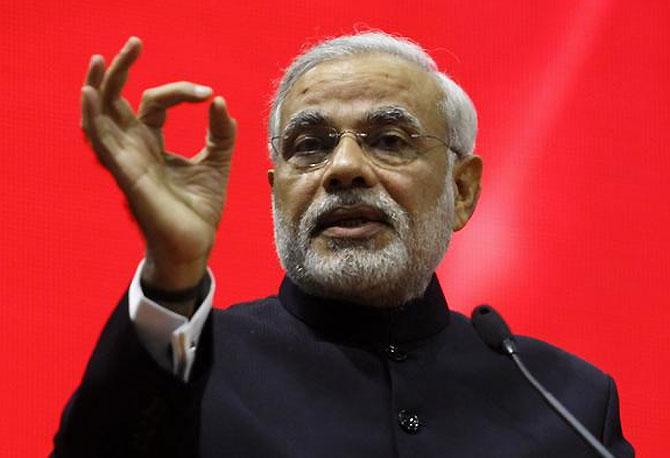
Some supporters say that with Narendra Modi’s anointment as the de facto leader of the party, there will be a turn in the BJP’s economic philosophy.
Many commentators in these pages and elsewhere have pointed out that the Bharatiya Janata Party (BJP)’s economic philosophy, since going into the opposition in 2004, has not been that different from that of the Congress.
By and large, they’ve supported major entitlement-based welfare programmes like the Mahatma Gandhi National Rural Employment Guarantee Act and if anything, have opposed minor reform measures such as allowing foreign direct investment in retail.
Some supporters of Gujarat Chief Minister Narendra Modi, now the BJP’s poll campaign chief, have suggested that with his anointment as the de facto leader of the party, there will be a turn in the BJP’s economic philosophy back toward economic reform, which animated the BJP-led National Democratic Alliance (NDA) when it was in power.
In that light, does Modi’s recent letter to Prime Minister Manmohan Singh show such a turn? In the letter, he articulated five objections he has to the food security Bill in its current form, which, if passed into law, would supersede the Ordinance that the government passed after the end of the last session.
Click on NEXT for more...
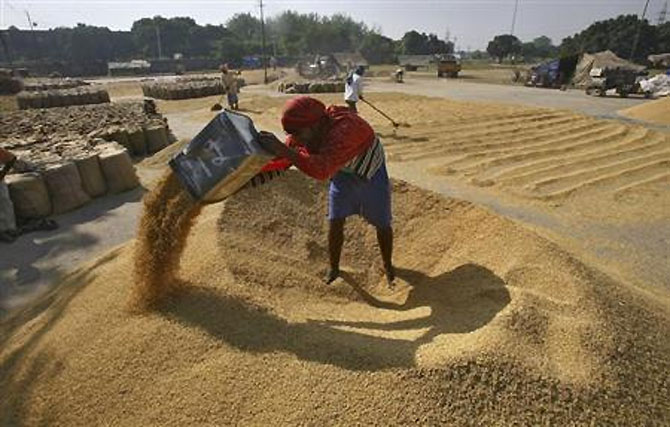
But first, let’s take a step back and consider what Modi had to say about the Bill in 2011.
At that point in time, his government’s critique of the Bill was sharp and focussed. On that occasion, the Gujarat food minister, presumably with the blessings of Modi, wrote to the Centre that it’s “easy to create entitlements and the country needs to reassess the culture of government subsidies and doles”.
This has the kernel of a principled centre-right objection to the food security Bill as adding yet another entitlement programme and helping perpetuate a culture of welfare dependency.
The contrast with Modi’s letter to the prime minister couldn’t be starker. Conspicuous by its absence is any such principled objection to the food Bill, Modi’s letter seems to suggest the Bill doesn’t go far enough in providing food security to the poor.
In particular, point two in his letter argues the food Bill will reduce the amount of food grain that an average family of five living below poverty line (BPL) would receive from 35 kg to 25 kg.
Point three amplifies further by arguing that if an average BPL family wished to purchase the 35 kg they currently receive, they’d have to pay more for it.
Point four suggests the amount of food grain provided for under the food Bill won’t furnish two square meals a day to an average person and it will be well below their calorie or nutritional needs, especially for those people engaged in labour-intensive activities.
Click on NEXT for more...
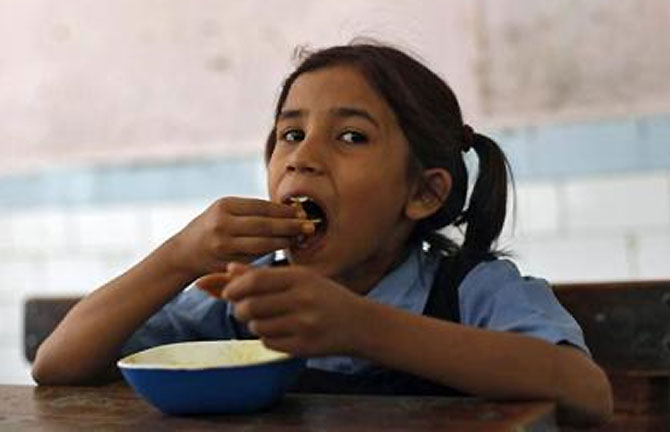
It’s ironic that points two, three and four in Modi’s letter, if one didn’t know the source, sound exactly as if they came from a critic from the Left, who would argue that the food Bill doesn’t do enough to help and has been watered down from the original draft proposed by the National Advisory Council (NAC).
The most interesting points in Modi’s letter are the first and the last. Point one argues that rather than establishing clear eligibility criteria, the approach of the food Bill is to fix the number of beneficiaries in advance and then ask the states to figure out the eligibility criteria to match up to those numbers.
This could lead, he argues, to discrepancies among different states in terms of who’s eligible, which would be avoided if eligibility criteria were fixed in advance rather than the number of beneficiaries.
While sound, this critique is not that different from Nitin Gadkari, former BJP president, writing recently in The Indian Express.
Nor ironically is it that different to the critique offered by Jean Dreze, a former member of the NAC, who’s argued that’s what’s needed are state level eligibility criteria.
Dreze told me this ought to work on the basis of the so-called “exclusion criteria”, which stipulate who’s not eligible to receive support; by definition anyone not excluded would have an entitlement under the food Bill.
While different in terms of details from Modi’s suggestion, what’s more striking is that one hardly sees any major ideological difference between them on the desirability of a food Bill and the need to stipulate eligibility criteria.
Click on NEXT for more...
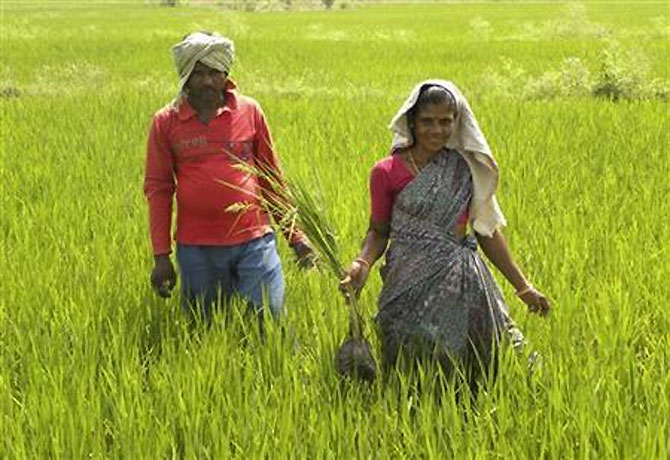
The odd man out is the fifth and final point in the letter, which points out the “illogicality” of providing food support to two-thirds of the population when the Planning Commission’s own estimates show a much smaller percentage of the population living BPL.
But intriguingly, Modi leaves open what he believes the right criterion should be.
One could read his earlier points as suggesting that the food Bill should target those most in need and not help those above the poverty line (APL), but yet he fails to make this argument and is merely content to point out the disconnect between the poverty line and the much larger percentage of the population who’ll be entitled to food support under the government’s Bill.
Modi’s letter, if it’s indicative of the line he’s going to be taking on economic policy issues, hardly represents any kind of a turn from the BJP’s recent policy positions.
Stepping back from the more trenchant critique his government made two years ago, which called into question the very premise behind large-scale entitlement programmes, Modi seems to have retreated into quibbling about details of the Bill, but suggesting he supports the concept of the food security Bill, while keeping his exact views a bit vague, perhaps deliberately so.
This is no different from the view articulated by other senior leaders of the BJP, including most recently Gadkari, who finds fault with the food Bill, but says the BJP supports it in principle.
Click on NEXT for more...
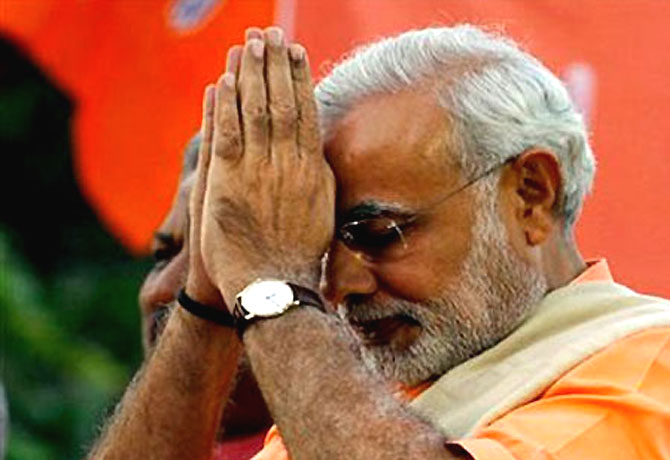
Modi's comments on the food Bill in his much publicised Independence Day speech echoed those in his letter and only reinforce further the message that he appears to exemplify another version of economic populism rather than any kind of center-right reform.
On the basis of this evidence then, the promise of a game changing “Modinomics” is a damp squib rather than a fire cracker lighting up the landscape of economic policy.
| Modi's letter to the PM says |
The food Bill does not clearly provide eligibility criteria for entitlements. This could lead to “wide regional disparities”, which would be open to judicial scrutiny and would create confusion Without the statutory "right to food", BPL families were so far already getting 35 kg per month, and the food security ordinance proposes to reduce it to 25 kg As per the proposed pricing structure, the BPL family will now have to incur Rs 85 more net expenditure per month for 35 kg of grain, which they were getting without the "right" The proposed entitlement of 5 kg per month per person does not assure an individual of having two meals a day While on one hand, the Planning Commission has been claiming the reduction of BPL numbers, on the other, the government has deemed it fit to provide food support to about two-thirds of the population |